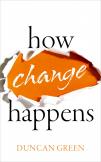Duncan Green provides an insightful handbook for social change in "How Change Happens."
Penha, a Brazilian organizer, is featured toward the end of Duncan Green’s book How Change Happens. She is the kind of person who astonishes: She was born into poverty, married young and raised six children. Despite all that she was facing in life, Penha took over the leadership of a worker’s union when the previous leader was murdered under suspicious circumstances.
Green’s humanistic writing and eye for detail draw us into Penha’s orbit. We find a woman with the strength of an ox and an overflowing enthusiasm for life. She welcomed all into the community with her gentle laugh and kind words. Penha was a leader who, in Green’s words, “created space” for others.
Duncan Green’s book also creates space for others—in this case, space for political and economic actors and institutions that the activist community tends to discount in their efforts towards social change.
Green, currently a senior strategic adviser at Oxfam GB, brings a wealth of experience to this work. Along with professional experience primarily in trade and development, he is the author of several other books that focus mainly on Latin America. His unique contribution to the intellectual groundwork necessary for social change is what he calls a “power and systems” approach. This approach delves into the complex nature of power as well as the complex reality of political and economic systems, states, institutions, laws, policies and customs.
The gift of this book is the author’s ability to translate extensive political and economic readings, experience working within political institutions and agencies, and the struggles of activism into an insightful and useful handbook. He well understands from his own activist background why there is impatience to change the world. He also understands, however, that the activist world is just one part of a larger world that activists must engage. Through the author’s judicious use of case studies, the reader comes to see that in the warp and woof of social change there is a place and role for all, from the banker to the banana farmer.
In a world in which so many of the world’s positive social changes are at risk of being reversed by a daunting trifecta of climate change, inequality and the rise of authoritarian populist governments, it is all the more urgent that the activist community make good use of this thoughtful and nuanced guide. Green’s book is not didactic. It reads more like a conversation with someone who has years of experience working, thinking about and acting for social change. The reader is welcome, and should weigh in with his or her thoughts and experience. In this conversation, this reviewer would not find it surprising, as Green did, that faith and culture are often alive and well within various activist circles.
A reader might also note that it was St. Ignatius Loyola, not St. Francis Xavier, as Green writes, who was the founder of the Jesuit religious order. And it is useful to remember St. Ignatius’ dictum that we are to express our love for one another and the world more in deeds than in words. How Change Happens would certainly be of help in the transformation of the dialectic of thought and action into a praxis of social change.
This article also appeared in print, under the headline “From thought to action,” in the March 6, 2017, issue.








